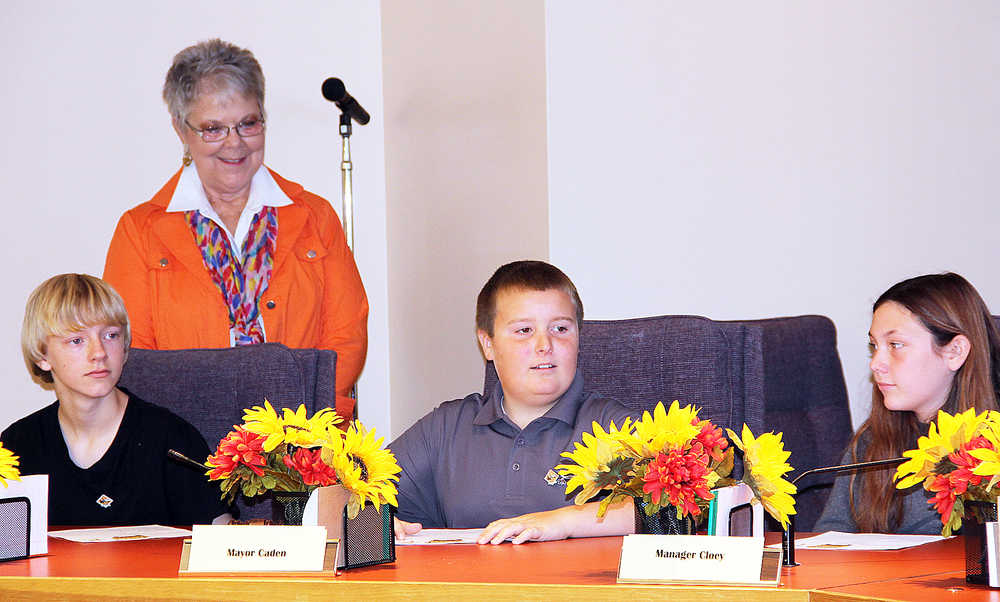Future police officers, city council members and judges spent a day learning how Kenai city government works.
Three classes from Kaleidoscope School of Arts and Science traveled to Kenai City Hall on Oct. 6 and experienced working in a police station, courtroom and council chambers. By the end of the day, the students learned city business is more than just sitting in chairs that spin and banging a gavel.
Fifth and sixth grade students from Julie Stephens’ class got the first chance to run a city council meeting. Kenai Mayor Pat Porter shared some insight on how a council operates. Then, the class, with their roles pre-assigned, took their seats and went through a customized agenda.
Mayor Caden Fields directed the council through the agenda, with Porter behind him to assist in the procedural details. The mock council had two public hearings on the agenda – an ordinance to close the library and an ordinance that would extend physical education from two days to five days a week.
A handful of students commented on each issue and spoke about the importance of the library to their learning. The students also spoke against extending P.E. for various reasons including how having gym everyday would be exhausting, to how it would cut into other activities like music and library-time. Another student was concerned the school would have to pay the gym teacher more for the extra P.E. time.
After hearing the public comments on both topics, the council discussed their opinion before the vote. Council member Jacob Begich said he didn’t think P.E. should be extended because it’s important that students receive a balance of activities. Council member Jayla Conner said the library should stay open because it is vital for learning. Both ordinances failed.
Fields said running the meeting was more difficult with an audience of parents watching then when students practiced in class.
“It was interesting and fun because I got to experience something I could do in the future,” Fields said.
Fifth grader Joshua Tree said it was cool that the public could be part of the process and express their concerns to the council.
“It’s nice the public has a voice and it’s not just the people representing that is making all the choices,” he said.
The students also brought other issues to the council’s attention from sixth grade moving over to the middle school, concerns about flooding and roundabouts to which Fields replied, “I will share that concern with Soldotna.”
Stephens said the students were passionate in their public comments. The trip to city hall gave her class a great opportunity to learn about the public process and understand that the public has a voice in government decisions, she said.
After touring the police station, Joy Harper’s third and fourth grade class walked to the old courthouse in the legislative office building for Kenai Youth Court. Ginny Espenshade, Executive Director of Kenai Youth Court, gave a brief explanation of the judicial system.
Prior to the field trip, Harper’s class discussed the book, “Bully” by Patricia Polacco. Espenshade then assigned roles for the class to hold a mock trial with the characters from the book. Students were divided into judges, court clerks, prosecutors, defense attorneys, the defendant, the victim, witnesses and jurors.
The class went through the court procedures and discussed all sides of the story from all parties involved. Espenshade said while the defendant should be held accountable for their actions and there are consequences for bullying, there may be other factors to why someone acts out.
Cindy Hurst’s fifth grade class toured the Kenai Police Department with school resourse officer Alex Prins.
Inside the station the class visited the dispatch office where the calls come in and the fingerprint and evidence room. Prins showed the class how to take fingerprints and seal evidence of a crime to send to a lab for testing.
The class also visited the interrogation room where police officers interview suspects and witnesses to crimes and on the other side of the window are investigating officers that listen and take notes.
Harper said the three classes are studying government and the field trip allowed the students to better understand the three branches of government, judicial, legislative and executive.
“The city council is the legislative branch that creates laws and the service the police department provides through the executive branch is enforcing the laws,” Harper said. “They get the realization that it isn’t as easy as it looks and there are procedures to follow. It’s not about a gavel and a robe, but enacting business on how to get things done.”
Reach Dan Balmer at daniel.balmer@peninsulaclarion.com

